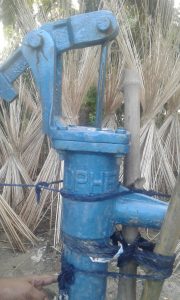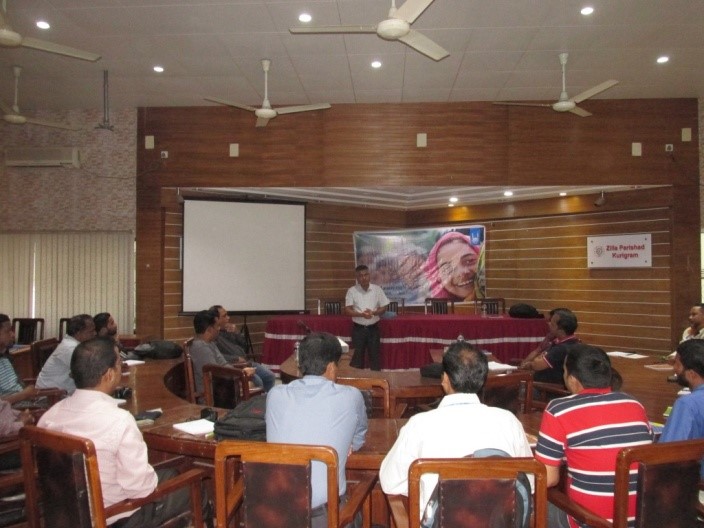Islamic Relief Bangladesh: learning from experience and responding to complaints
Ensuring that people and communities have access to accurate, understandable information about the aid provided and the aid provider is the first step in enabling them to make a decision, create opportunities to voice their opinions and see this taken on board. Islamic Relief takes community participation and complaint mechanisms seriously, in line with Islamic Relief Worlwide’s commitment to the Core Humanitarian Standard on Quality and Accountability (CHS).
Workers of supplier asking for food as a condition to install wells
In August last year, as they were installing a series of deep tube-wells in the district of Jessore, Southwest Bangladesh, to reduce the vulnerabilities of water-logged victims, Islamic Relief’s team received a complaint from district representatives on behalf of the community. They complained that the workers from the local supplier were demanding meals and other benefits, such as firewood, homestead vegetables or electricity in exchange for the installation of the wells.
At first, some people gave in, fearing that they would otherwise not get any well installed. Luckily, in the inception phase of the project, the team had informed affected people about their entitlements and rights, underlining that they did not need to give anything to aid workers and services providers in exchange for assistance.

As soon as the complaint came in through the hotline, Islamic Relief’s team immediately registered it in their complaint log and informed their management in line with the agency’s Complaint Response Mechanism (CRM) guidelines. A joint investigation committee was set up, consisting of representatives of both Islamic Relief and the service provider. Together, they reviewed the complaint and carried out an investigation, including some field visits. They found the complaint to be valid and discovered some other issues that were not in compliance with the contract between the agency and the service provider, but also with the agency’s commitment to the Core Humanitarian Standard on Quality and Accountability (CHS).
As a consequence, they made some recommendations to the service provider, demanding that they take action in a timely manner. They refunded the involved people in cash. Islamic Relief’s team informed the persons who lodged the complaint and the involved community members in person or by phone about the action taken in response.
“We have worked with numerous NGOs, but we have never seen any agency that has as effective a complaint response system as Islamic Relief,” said Md. Zia ur Rahman, UP representative of 11 Chaluahati Union who lodged the complaint. “They dealt with our complaint appropriately and timely”.
Going to district representatives is a shortcut to social mapping
From September 2014 to April 2015 Islamic Relief has carried out two projects to support affected communities in the Kurigram and Lalmonirhat districts to find alternative livelihood options. The projects specifically targeted orphan families and widows.
In order to capture lessons learned throughout the project’s life cycle, Islamic Relief invited all staff members to a workshop on 17 and 18 April 2017. In parellel, the colleagues from the Monitoring, Evaluation, Accountability and Learning (MEAL) carried out a consultation process involving various stakeholders such as affected people, community leaders, district representatives and government officials.

Huge social mapping exercises were carried out in the run-up to the implementation phases of the projects in order to identify orphan households and widows. This was very time- and resource consuming. As in Bangladesh district representatives and community leaders know each and every orphan and widow in their respective areas, it turned out that the mapping exercise could have been completed much faster and maybe even more effectively with their immediate involvement. Hence, that’s exactly what Islamic Relief’s team did when kick-starting a similar livelihood project in the Rangpur district.
Islamic Relief Bangladesh has established comprehensive mechanisms to identify, collect and analyse lessons learned throughout all its projects and programmes. Generally, it is the MEAL team’s responsibility to collect lessons learned and feed them into existing/and future programmes and projects.
Islamic Relief Bangladesh (IRB) started its humanitarian work in 1991 by providing support to the survivors of a cyclone in Chittagong. IRB continued to expand its operations across many sectors of humanitarian response, including climate change, disaster risk reduction, child welfare programmes, community development and livelihood programmes. It has established its credibility among local NGOs and the authorities in Bangladesh. The steady growth of operations has led IRB to become one of the biggest offices in Islamic Relief and also establish one of the largest Monitoring Evaluation Accountability & Learning Departments (MEAL).
For more information, please get in touch with mahabubur.rahman@islamicrelief-bd.org (Coordinator; Program Quality, Learning and Research)


